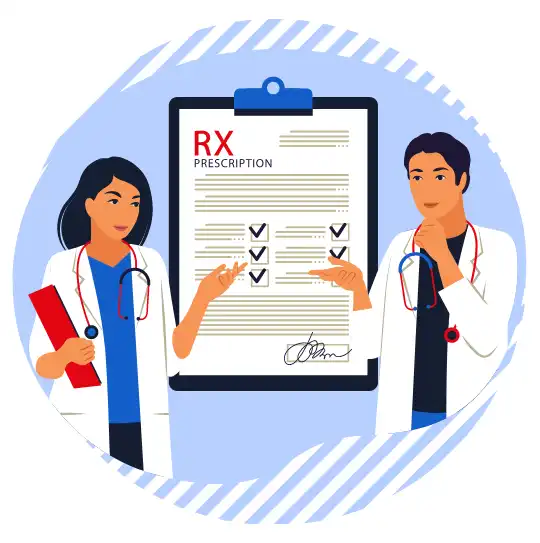What are acetaminophen and ibuprofen?
Acetaminophen (Tylenol) is an over-the-counter analgesic (pain reliever) and antipyretic (fever reducer) drug for children and adults.
Ibuprofen is a nonsteroidal anti-inflammatory drug (NSAID) used to treat mild to moderate pain and fever in children and adults. It is available as OTC low strength and prescription-only high strength.
Both acetaminophen and ibuprofen are available as tablets, caplets, liquids, and injections.
What are the main differences between acetaminophen and ibuprofen?
Ibuprofen (Advil or Motrin) is an NSAID; it is available over the counter and in prescription-only strength. It works by inhibiting the COX enzyme to block the production of prostaglandins – chemicals that cause inflammation.
In contrast, acetaminophen (Tylenol) does not have an anti-inflammatory effect. It is believed to act on a certain receptor in the brain that is involved in pain sensation. It also works on the temperature-regulating area of the brain to relieve fever.
Which lasts longer?
Both acetaminophen and ibuprofen are short-acting and require multiple doses per day. Both can be taken as frequently as every four to six hours. However, they can be taken less often by using extended-release formulations.
What are the doses for acetaminophen and ibuprofen?
The usual dose of OTC ibuprofen is 200 – 400 mg every 4 – 6 hours without exceeding 1200 mg/day; the usual prescription dose for ibuprofen is 400 – 800 mg every 6 hours without exceeding 3,200 mg/day. Check out our frequently asked questions on ibuprofen dosing.
Regular strength acetaminophen on the other hand, is dosed 325 – 650 mg orally every 4 hours as needed without exceeding 3250 mg/day; dosing for extra strength is 1,000 mg orally every 6 - 8 hours as needed without exceeding 3,000 mg/day.
Which is more effective?
Both acetaminophen and ibuprofen are effective for mild to moderate pain and fever. Examples of mild to moderate pains are headaches, back pain, toothaches, muscle aches, sprains, and menstrual cramps.
Acetaminophen is also commonly used to treat pain from arthritis, migraine, and dysmenorrhea, but ibuprofen is more effective.
A study has shown that ibuprofen is more effective overall to treat pain and fever than acetaminophen in children and adults. Though ibuprofen is more effective, acetaminophen has a lower risk of serious side effects than ibuprofen.
One treatment option may be preferable over the other depending on the extent of pain, overall health, possible interaction with other drugs, and the risk of side effects.
Is it safe to take acetaminophen and ibuprofen together?
Acetaminophen and ibuprofen may be taken together or alternated for a stubborn fever. The combination is safe for short-term pain relief. A study has shown that the combination is more effective than each alone. An example of a combination formulation on the market is Advil Dual Action with Acetaminophen.
Which is safer during pregnancy?
Acetaminophen is safer in pregnant women. Ibuprofen should be avoided because of the high risk of adverse effects. The FDA warns against using NSAIDs in pregnancy at 20 weeks or later.
Are acetaminophen and ibuprofen safe for children?
Both acetaminophen and ibuprofen are safe for children. The choice will depend on your child’s overall condition.
What are the common side effects of acetaminophen and ibuprofen?
Side effects of acetaminophen may include:
- nausea and vomiting
- constipation
- skin rash
- stomach discomfort
- liver damage
Side effects of ibuprofen may include:
- constipation
- diarrhea
- bloating
- nausea
- heartburn
- indigestion
- skin rash
- kidney problems
What are possible drug interactions with acetaminophen or ibuprofen?
Ask your healthcare provider if you are taking medications that can interact with acetaminophen or ibuprofen. The lists below are not exhaustive; always ask your pharmacist or doctor.
Possible interactions with acetaminophen:
- isoniazid
- phenytoin (Dilantin)
- carbamazepine (Tegretol)
- warfarin (Coumarin)
- disulfiram (Antabuse)
- lorazepam (Ativan)
- topiramate (Topamax)
Possible interactions with ibuprofen:
- lisinopril (Zestril)
- ketorolac (Acular)
- methotrexate (Trexall)
- albuterol (ProAir)
- atenolol (Tenormin)
- clomipramine (Anafranil)
- fluoxetine (Prozac)
You should note that both acetaminophen and ibuprofen increase the risk of bleeding if taken with alcohol.
Which is the cheaper option?
Acetaminophen is available over the counter. Because of this, Medicare and most insurance may not cover it. The average cost of acetaminophen is around $11.99. However, Medicare and most insurance will cover high-strength ibuprofen which is a prescription-only medication. The usual cost of prescription ibuprofen is around $15.
You can save up to 88% on both acetaminophen and ibuprofen with an RxLess prescription saving card. Get your card free and use it at most pharmacies, including CVS, Rite Aid, and Walgreens.

















